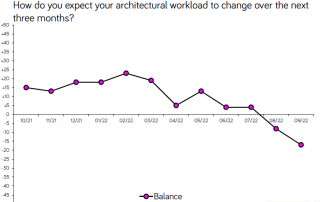
The RIBA Future Trends Workload Index fell by nine points in September to minus 17, the lowest score, outside of lockdown since 2009.
Only 16% of practices said they expect workloads to pick up at all in the next three months, while 32% expect them to decrease and 52% expect them to remain the same.
All the monitored work sectors have posted a negative balance, and three have shown a further deterioration in confidence since August. The private housing sector has fallen to a balance figure of -17, down from -9. This is a fall of 37 points in the year from January, and a 59 point fall compared to the all-time peak of +42 in May 2021.
The commercial sector fell a further five points in September, returning a figure of -7, down from -2. There has been a slight increase in optimism in the public sector this month, with a balance figure of -8, compared to -9 in August. The outlook for the community sector remains negative, with a balance score of -7 this month, compared to -6 in August.
Confidence in future workloads is low across all regions. London is the most pessimistic region, with a balance score of -23 in September, down from -7 in August. On average, workloads in London practices are 86% of those seen a year ago. Elsewhere, Wales & the West has seen a slight decrease in pessimism, -17 compared to –22 in August. The South of England (-20) and the Midlands & East Anglia (-21) have both slipped further into negative territory. The North of England has dropped into negative territory for the first time since June 2020, returning a Workload Index score of -5.

The monthly survey also asks about employment and staffing. For the first time in two years, the RIBA Future Trends Permanent Staffing Index fell into negative territory, at -6, down eight points from August.
Just 7% of practices expect to employ more permanent staff over the coming three months, whilst 13% expect to employ fewer; 80% expect permanent staffing levels to stay the same. Smaller practices were more likely to be expecting numbers to decline.

When it comes to the Staffing Index, all regions bar one (Wales & the West at +5) are now in negative territory. London posted a figure of -19, down from -4, with 20% of practices here expecting to employ fewer permanent staff in the coming three months. The Midlands & East Anglia (Staffing Index -6), The South of England (-2), and the North of England (-5) also returned negative figures.
Adrian Malleson, head of economic research and analysis at The Royal Institute of British Architects (RIBA), said: “This month’s findings are stark – aside from lockdown, architects are now more pessimistic about future workloads than at any time since the financial crisis of 2009.
“We see pessimism across all regions and sectors. Of note, in the capital, nearly a quarter of practices expect workloads to contract in the coming three months. And looking at the private housing sector which had seen a post-Covid boom, confidence has fallen rapidly.
“Brexit, inflation, rising interest rates, post-Covid recovery, the war in Ukraine, and crumbling market confidence in UK fiscal policy all continue to weigh down on the UK economy and the construction sector.
“We can likely expect a contraction in architects’ workloads in the coming months, and into next year. A return to growth depends in part on the UK’s response to the energy crisis, on whether we begin in earnest to create a design-led, sustainable built environment.
“We will continue to report these findings to the government and work with other built environment bodies to monitor ongoing trends.”
A total of 234 practices took part in the survey in September 2022.
Got a story? Email [email protected]
